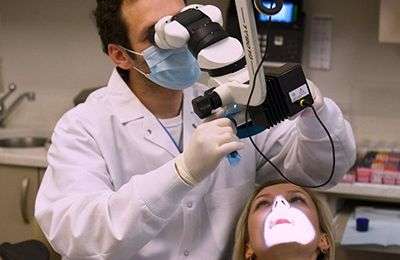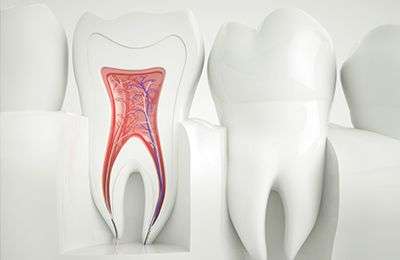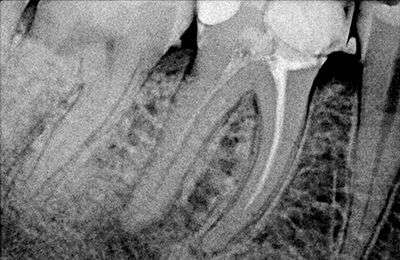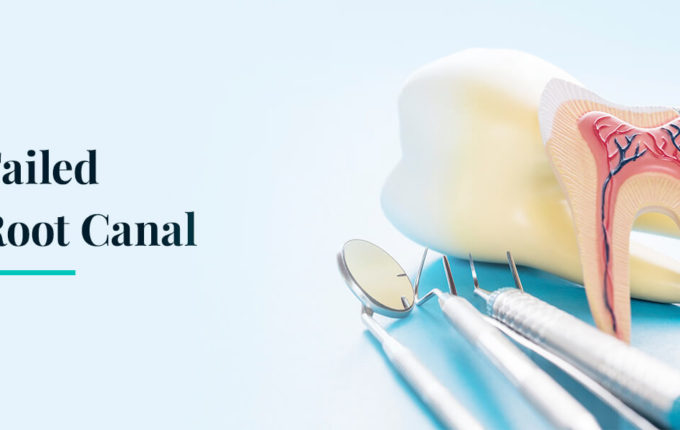Difference Between an Apicoectomy and Root Canal Therapy

Root canal therapy and apicoectomy are two separate procedures, done for different reasons. One does not compete with the other, they work in concert to save our teeth. Learn more about apicoectomies vs. root canals below.
Causes and Treatments of a Root Canal
A root canal procedure is needed when an invasion of bacteria occurs in the pulp (nerve) of the tooth.
1. Caused by:
2. Leading to:
- Pain
- Swelling
- Sensitivity to hot and cold
- Sensitivity to percussion and chewing
- Throbbing pain upon lying down
- Abscess, infection formation
3. Treated by:
- Extirpation of infected pulp (nerve)
- Sterilization of canal
- Obliteration of canal
- Placement of Crown
Root Canal Therapy Procedure
Root canal therapy is a very common procedure when there is enough healthy tooth structure to restore and the pulp tissue (in the center of the tooth) has been compromised. This is a non-invasive procedure done under local anesthesia.
People return to work the very same day as the root canal treatment and there is very little post-operative sensitivity, which can be controlled with Tylenol and or Advil. The very next day people can eat a soft diet, go to the gym and start enjoying their lives.
Sometimes antibiotics are prescribed if the patient presents with an infection (abscess) at the tip of the root. These procedures are 97% successful after five years.
What is an Apicoectomy Procedure?
Apicoectomy is a minor surgical procedure that removes the apex, or the very tip of the root. When the pulp dies and infection forms in our teeth, the pus migrates to the tip and is expressed in the bone around the tip of the root. This is a dental abscess or an infection that must be treated efficiently to prevent further problems.
Most of the time traditional root canal therapy solves the problem, however, in 3% of the cases, the infection does not resolve or redevelops after root canal therapy and crown placement.
The endodontist must make a decision out of three choices:
- Retreat the root canal therapy.
- Perform an Apicoectomy.
- Extract the tooth and consider an implant restoration.
According to most dental protocols, the root canal will be retreated, as this is a non-invasive procedure. Usually, we look to the apicoectomy procedure after the root canal procedure has failed, twice, to solve the problem of the infection at the tip of the root.
We never do an apicoectomy rather than root canal therapy at the initial stages of treatment. It is not one versus the other, because they are used together to supplement therapy. The apicoectomy is much more conservative than extracting the tooth and placing an implant.
The Apicoectomy Procedure
- Local anesthesia.
- Nitrous oxide may be used to supplement.
- A small incision in the gum at the tip of the root.
- The hole made in the bone to expose roots and infection.
- Removal of infection and tip of the root.
- Sealing of the apex.
- Closing of the wound with sutures.
Postoperative Care After the Apicoectomy
- Slight swelling and discomfort for 2-3 days, ice ten minutes on and ten minutes off for 48 hours.
- Prescriptions of analgesic medication and antibiotics.
- Removal of sutures in 5-7 days.
- Resume light exercise after a week.
- Two weeks to be fully recovered.
- Most people return to work a day or two after the procedure.
Book An Apicoectomy Today with Dr. Lipner
Dr. Lipner has the clinical expertise and experience to do gentle, effective root canal therapies. His vast knowledge of the periapical disease has made him a master in deciding what treatment should be used when. To Dr. Lipner, you are a whole person, not simply a dental abscess.
Patients marvel at the pleasant, calming atmosphere that pervades their treatment room. We have an emergency service that will attend to your dental needs seven days a week. Call us today at (347) 708-8795.
 Our Providers
Our Providers
 Blog
Blog
 Contact us
Contact us
 Endodontics
Endodontics
 Root Canal Treatment
Root Canal Treatment
 Emergency Root Canal
Emergency Root Canal
 Root Canal Retreatment
Root Canal Retreatment
 Complimentary Teeth Whitening
Complimentary Teeth Whitening
 Teeth Whitening
Teeth Whitening




